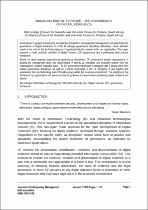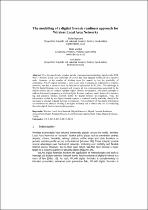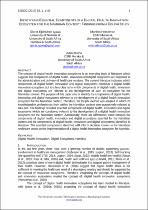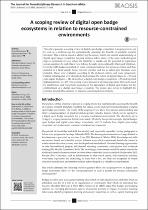JavaScript is disabled for your browser. Some features of this site may not work without it.
- ResearchSpace
- →
- Research Publications/Outputs
- →
- Journal Articles
- →
- View Item
| dc.contributor.author |
Grobler, MM

|
|
| dc.contributor.author |
Dlamini, IZ

|
|
| dc.date.accessioned | 2010-07-23T14:25:06Z | |
| dc.date.available | 2010-07-23T14:25:06Z | |
| dc.date.issued | 2010 | |
| dc.identifier.citation | Grobler, MM,Dlamini, IZ. 2010. Managing digital evidence: the governance of digital forensics. Journal of Contemporary Management, Vol. 7, pp 1-21 | en |
| dc.identifier.issn | 1815-7440 | |
| dc.identifier.uri | http://search.sabinet.co.za/WebZ/Authorize?sessionid=0&bad=ejour/ejour_badsearch.html&portal=ejournal&next=images/ejour/jcman/jcman_v7_a1.pdf | |
| dc.identifier.uri | http://hdl.handle.net/10204/4125 | |
| dc.description | Copyright: 2010 Sabinet Online Ltd | en |
| dc.description.abstract | Governance in general is becoming increasingly important in contemporary management, but specifically the governance of Digital Forensics. In order to manage governance disciplines effectively, closer attention needs to be paid to the technical aspects of specialised fields covered within an organisation. This paper presents a novel, scientific definition of Digital Forensic (DF) governance and a preliminary best practice framework. DF involves the preservation, identification, extraction and documentation of digital evidence stored as data or magnetically encoded information (Vacca 2002:731). This extends to include the recovery, analysis and presentation of digital evidence in a way that is admissible and appropriate in a court of law. This necessitates a crucial accuracy in following forensic procedures, the rules of evidence and the legal processes. In short, DF pertains to any digital artifacts found in computers or other digital resources that may have legal value in the business environment. The purpose of this article is to present a scientific definition for the DF governance discipline, as well as a preliminary best practice framework. At the time of writing, no formal definition or framework could be found, supporting the notion to develop this discipline. To enable this purpose, the article will conduct a brief literature overview on existing governance literature, explore current research on DF governance and present a definition and framework for DF governance | en |
| dc.language.iso | en | en |
| dc.publisher | SA ePublications | en |
| dc.subject | Governance | en |
| dc.subject | Digital forensics | en |
| dc.subject | Information technology | en |
| dc.subject | Information security | en |
| dc.subject | Digital artifacts | en |
| dc.subject | Digital resources | en |
| dc.title | Managing digital evidence: the governance of digital forensics | en |
| dc.type | Article | en |
| dc.identifier.apacitation | Grobler, M., & Dlamini, I. (2010). Managing digital evidence: the governance of digital forensics. http://hdl.handle.net/10204/4125 | en_ZA |
| dc.identifier.chicagocitation | Grobler, MM, and IZ Dlamini "Managing digital evidence: the governance of digital forensics." (2010) http://hdl.handle.net/10204/4125 | en_ZA |
| dc.identifier.vancouvercitation | Grobler M, Dlamini I. Managing digital evidence: the governance of digital forensics. 2010; http://hdl.handle.net/10204/4125. | en_ZA |
| dc.identifier.ris | TY - Article AU - Grobler, MM AU - Dlamini, IZ AB - Governance in general is becoming increasingly important in contemporary management, but specifically the governance of Digital Forensics. In order to manage governance disciplines effectively, closer attention needs to be paid to the technical aspects of specialised fields covered within an organisation. This paper presents a novel, scientific definition of Digital Forensic (DF) governance and a preliminary best practice framework. DF involves the preservation, identification, extraction and documentation of digital evidence stored as data or magnetically encoded information (Vacca 2002:731). This extends to include the recovery, analysis and presentation of digital evidence in a way that is admissible and appropriate in a court of law. This necessitates a crucial accuracy in following forensic procedures, the rules of evidence and the legal processes. In short, DF pertains to any digital artifacts found in computers or other digital resources that may have legal value in the business environment. The purpose of this article is to present a scientific definition for the DF governance discipline, as well as a preliminary best practice framework. At the time of writing, no formal definition or framework could be found, supporting the notion to develop this discipline. To enable this purpose, the article will conduct a brief literature overview on existing governance literature, explore current research on DF governance and present a definition and framework for DF governance DA - 2010 DB - ResearchSpace DP - CSIR KW - Governance KW - Digital forensics KW - Information technology KW - Information security KW - Digital artifacts KW - Digital resources LK - https://researchspace.csir.co.za PY - 2010 SM - 1815-7440 T1 - Managing digital evidence: the governance of digital forensics TI - Managing digital evidence: the governance of digital forensics UR - http://hdl.handle.net/10204/4125 ER - | en_ZA |









